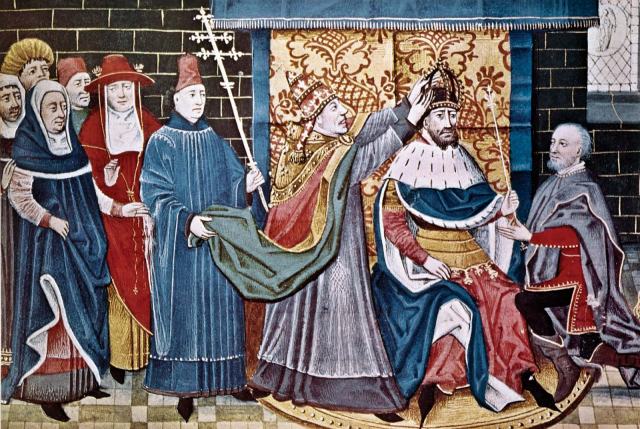
While I’m mainly concentrating on theologians for these Sunday posts (well, they’re USUALLY on Sundays, anyway), I don’t think it would be out of place to discuss Charlemagne, one of the most significant kings in the post-Roman era. While not a theologian, he was a major patron of Christianity. Charlemagne was ruler of the Franks, a Germanic tribe that had traditionally been ruled by the Merovingian Dynasty. By the seventh century, however, the Merovingians were largely just figureheads, with the true power belonging to the Mayors of the Palace. In 751, a man who would be known to history as Pepin the Short gained the assistance of Pope Zachary in becoming King of the Franks. He was the first member of the Carolingian Dynasty, named after Pepin’s father Charles Martel. Pepin had two sons, Charles and Carloman, who by the Frankish laws of inheritance both became rulers. Carloman was the less effective of the two, so it wasn’t until his death in 771 that Charles really began to assert his strong authority over the kingdom. Charles expanded his territory and power through warfare, conquering the Lombards of northern Italy, battling the Asian Avars who lived in what is now Hungary, and making constant efforts to subdue the Saxons. When he delivered an ultimatum to the Saxons to either convert to Christianity or be killed, he ended up having 4500 of them put to death by beheading. Charles was also renowned as an administrator, and promoted education and literacy in his kingdom. He apparently was not much of a reader himself, but he did speak Latin and understand Greek. No one knows for sure what his native language was, as there were numerous Germanic dialects existing at the time.
After Charles’ measures to restore Pope Leo III to Rome, where he had been challenged and attacked, the Pope crowned Charles as Emperor.

This occurred during the mass on Christmas Day in 800, which means the 1210th anniversary is coming up. How do YOU plan to celebrate? {g} Popular rumor has it that Charles was unaware of the Pope’s intentions prior to the actual coronation, but this is somewhat doubtful. As Wikipedia puts it, “certainly he cannot have missed the bejeweled crown waiting on the altar when he came to pray.” Anyway, it is largely believed that the coronation was a direct move from the Pope to challenge the imperial government in Constantinople, which considered itself successor to the Roman Empire. Charlemagne is sometimes considered the first Holy Roman Emperor, although the more common view seems to be that it was Otto the Great, crowned about a century and a half later, who was truly the first, with Charlemagne as sort of a predecessor.

This monument is typically thought to portray Otto, but it was carved almost three centuries after his lifetime, so I don’t know how accurate it is. Dude looks pretty foppish, though, doesn’t he?
Charlemagne did set the precedent of the Emperor being crowned by the the Pope, which his own descendants did not follow, but the later emperors beginning with Otto did. The Holy Roman Empire technically existed until the beginning of the nineteenth century, when Napoleon took over and claimed that none of the three words in its name were true.

“And the same goes for the Moral Majority!”
Charlemagne died in 814, and while he left quite a legacy as first ruler of what would eventually become France and Germany, his descendants really didn’t live up to it. His son Louis was a weak ruler, and after his reign the empire was divided among Louis’ sons, officially ending in 888 with the death of Louis’ grandson Charles III (AKA “Charles the Fat”; it’s crazy how unflattering a lot of these royal nicknames were). It wasn’t until Otto that another strong emperor would arise in Europe, and his territory was mostly limited to the German states. The Carolingians continued to rule France until the late tenth century, but they did not have much actual authority.

Cool! A lot more than I remember from History in high school, and you didn’t even get to the Magna Carta! :)
Or the Magna Doodle, for that matter.
Pingback: Oh, Baby, Baby, It’s a Wild Hunt | VoVatia
Pingback: I Have Seen the Sleeping Knights of Jesus | VoVatia
Pingback: Capturing Carpio | VoVatia
Pingback: Give Me Back My Name | VoVatia
Pingback: Drawn Into Divine Drama | VoVatia
Pingback: Roland in the Deep | VoVatia